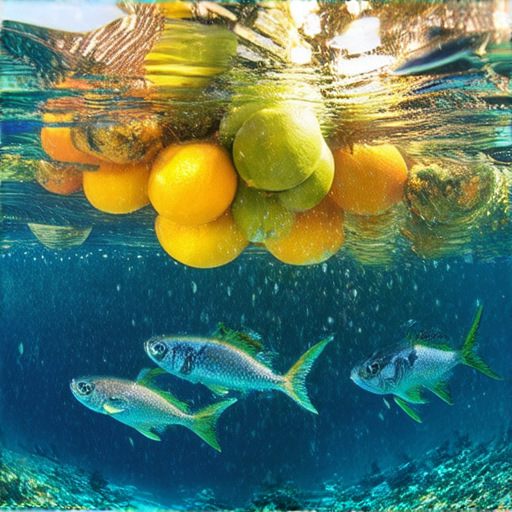Unlock the full flavor potential of your catch with the art of citrus-marinated fish – a culinary technique that has been perfected by chefs around the world. By harnessing the power of citrus fruits like lemons and oranges, you can elevate the taste and texture of even the most delicate fish varieties, creating dishes that are both visually stunning and tantalizingly delicious.
Citrus marinades work their magic by breaking down proteins, tenderizing the flesh, and infusing it with a depth of flavor that’s simply unmatched by other cooking methods. But what exactly happens when you marinate fish in citrus? And how long can you safely leave it soaking in those zesty juices? In this comprehensive guide, we’ll delve into the science behind citrus marinades, explore the benefits of using different types of citrus fruits, and provide you with expert tips on how to achieve perfect results every time.
Whether you’re a seasoned chef or a culinary novice, our ultimate guide to citrus-marinated fish will walk you through the entire process, from preparing the fish to selecting the right marinade ingredients and determining the ideal marination time. We’ll cover everything from the basics of citrus marinades to advanced techniques for achieving optimal flavor and texture, ensuring that you’re equipped with the knowledge and confidence to create mouth-watering citrus-marinated fish dishes that will impress even the most discerning palates.

Marinating Fish in Citrus: A Guide
When it comes to marinating fish in citrus, timing is everything.
-
The acidity in citrus-based marinades can quickly cook the fish, making it essential to keep the marinating time short.
-
Avoid leaving strong citrus-based marinades on fish for more than 30 minutes to prevent overcooking.
-
For delicate fish like sole or flounder, limit the marinating time to 15-20 minutes.
-
Thicker fish like salmon or tuna can handle longer marinating times, up to 45 minutes.
Seasoning Before Marinating
Before adding the marinade, season the fish with salt and pepper to enhance flavor.
-
Salt helps to balance the acidity in the marinade and brings out the natural flavors of the fish.
-
Pepper adds a touch of warmth and depth to the dish.
Citrus-Based Marinades
Citrus-based marinades are a great way to add flavor to fish without overpowering it.
-
Lemon juice is a popular choice for its bright, citrusy flavor.
-
Lime juice adds a tangy, slightly sweet taste.
-
Orange or grapefruit juice can add a fruity twist to traditional marinades.
Tips for Safe Marinating
To ensure safe marinating practices:
-
Always refrigerate the fish during marinating.
-
Keep the marinade cold, around 40°F (4°C), to prevent bacterial growth.
-
Don’t overcrowd the container, allowing for adequate space between each piece of fish.
What Does Citrus Do to Raw Fish?
Citrus plays a crucial role in the process of making ceviche, a dish that involves marinating raw fish in an acidic liquid.
- The acidity in citrus fruits like lemons and limes helps to break down the proteins in the fish, making it safe to eat.
- This process is called denaturation, which occurs when the acid in the citrus disrupts the molecular bonds between the proteins, causing them to unwind and become more accessible to enzymes.
- As a result, the fish becomes opaque and firmer in texture, giving it a cooked appearance and feel.
How Does Citrus Affect Fish Proteins?
The acidity in citrus fruits works by disrupting the hydrogen bonds between the amino acids in the fish proteins, causing them to unfold and become more susceptible to enzymatic degradation.
- The citric acid in citrus fruits has a pH level of around 2.0, which is significantly lower than the pH level of the fish proteins.
- This difference in pH levels creates an environment that favors the breakdown of the fish proteins, allowing the enzymes to work more efficiently.
- As a result, the fish becomes tender and easier to digest, making it a popular choice for dishes like ceviche.
Benefits of Using Citrus in Ceviche
Using citrus in ceviche offers several benefits, including:
- Improved food safety: The acidity in citrus helps to kill bacteria and other microorganisms that may be present on the surface of the fish.
- Enhanced flavor: The citrus adds a bright, tangy flavor to the dish that complements the sweetness of the fish.
- Easier digestion: The acidity in citrus helps to break down the proteins in the fish, making it easier to digest.
Conclusion
In conclusion, citrus plays a vital role in the process of making ceviche, helping to break down the proteins in the fish and making it safe to eat.
The acidity in citrus fruits works by disrupting the hydrogen bonds between the amino acids in the fish proteins, causing them to unfold and become more susceptible to enzymatic degradation.
By understanding how citrus affects fish proteins, we can appreciate the importance of using high-quality citrus fruits in our cooking and the benefits they offer in terms of food safety, flavor, and digestion.

Marinating Fish: A Guide to Achieving Perfect Flavor
When it comes to preparing delicious fish dishes, marination plays a crucial role in infusing flavors and tenderizing the meat.
- Why Marinate Fish?
- To enhance flavor and aroma
- To tenderize the fish and make it easier to cook
- To add moisture and prevent drying out
The Ideal Marinating Time for Fish
The ideal marinating time for fish depends on several factors, including the type of fish, its thickness, and the acidity level of the marinade.
- Delicate Fish: 15 to 30 minutes
- Fatty Fish: 30 minutes to 1 hour
- Thicker Fish: 1 to 2 hours
Tips for Marinating Fish
To get the most out of your marinating process, follow these tips:
- Always use a non-reactive container to prevent metal flavors from transferring to the fish
- Keep the fish refrigerated during marination to prevent bacterial growth
- Don’t over-marinate, as this can lead to mushy texture and overpowering flavors
- Experiment with different marinades and seasonings to find your favorite combinations
Common Marinade Ingredients for Fish
Some popular marinade ingredients for fish include:
- Lemon juice or vinegar
- Olive oil
- Garlic
- Herbs like parsley, dill, or thyme
- Soy sauce or tamari
Conclusion
With these guidelines and tips, you’ll be well on your way to creating mouth-watering fish dishes that impress family and friends alike.
Remember to always handle and store fish safely to prevent foodborne illness.
Happy cooking!

What Changes Take Place When You Marinate Fish in Lemon Juice?
The process of marinating fish in lemon juice involves a series of chemical reactions that alter the texture and appearance of the fish.
- Citric acid present in the lemon juice reacts with the proteins in the fish, causing them to unwind and lose their native conformation.
- This reaction, known as denaturation, leads to the formation of new bonds between the protein molecules, resulting in a firmer texture.
- The acidity of the lemon juice also helps to break down the connective tissue in the fish, making it more tender and easier to chew.
How Does Citric Acid Affect Fish Proteins?
Citric acid works by disrupting the hydrogen bonds that hold the protein molecules together, allowing them to unfold and reorganize into a new configuration.
- The denaturation of proteins leads to the loss of their native structure and function.
- The unfolded proteins then interact with each other, forming new bonds and leading to the formation of a gel-like substance.
- This gelation process contributes to the firmer texture of the marinated fish.
Why Does Marinating Fish in Lemon Juice Result in a Cooked-Looking Texture?
The combination of denaturation and gelation caused by the citric acid in the lemon juice gives the marinated fish a cooked-looking texture, even though it has not been heated.
This effect is due to the breakdown of the protein structures and the formation of new bonds, which alters the appearance of the fish.
Key Takeaways:
- Citric acid in lemon juice denatures fish proteins, leading to a firmer texture.
- The acidity of the lemon juice breaks down connective tissue, making the fish more tender.
- The combination of denaturation and gelation gives marinated fish a cooked-looking texture.
Marinating Seafood Safely
To avoid cooking seafood in acid, it’s essential to understand how marinating affects its texture and flavor.
- Avoid Over-Marinating: Acidic ingredients like citrus juice, vinegar, or wine can break down proteins and tenderize seafood quickly.
- Time Limits: Large shrimp should not be marinated for more than 45 minutes, while fish should not exceed 30 minutes to an hour, depending on its firmness.
- Acidity Levels: Citrus marinades, in particular, can be quite acidic, so it’s crucial to monitor the marinating time to prevent over-acidification.
- Monitoring Temperature: Keep an eye on the temperature of your refrigerator during the marinating process to ensure it remains below 40°F (4°C), preventing bacterial growth.
- Choosing the Right Marinade: Opt for a balanced marinade with a mix of acidic and non-acidic ingredients to achieve the perfect balance of flavors and textures.
- Don’t Forget to Rinse: After marinating, always rinse the seafood under cold running water to remove excess acidity and prevent further breakdown.
By following these guidelines, you’ll be able to enjoy perfectly marinated seafood without compromising its texture or flavor.
Additional Tips for Safe Marinating:
- Use Glass Containers: Store your marinating mixture in glass containers to prevent chemical reactions between acidic ingredients and metal.
- Keep it Cold: Refrigerate your marinating mixture at a consistent temperature below 40°F (4°C) to slow down bacterial growth.
- Monitor pH Levels: Use pH test strips or a pH meter to check the acidity levels of your marinade and adjust accordingly.
- Don’t Overdo It: Limit the marinating time to the recommended duration to prevent over-acidification and texture changes.
Safe Marinating Practices for Different Types of Seafood:
- Fish: Delicate fish like sole or flounder require shorter marinating times (15-30 minutes), while firmer fish like salmon or tuna can tolerate longer marinating times (30-60 minutes).
- Shrimp: Large shrimp should not be marinated for more than 45 minutes, while smaller shrimp can tolerate shorter marinating times (15-30 minutes).
- Oysters: Oysters are highly sensitive to acidity and should not be marinated for more than 10-15 minutes.

Washing Fish Before Marinating
When it comes to preparing fish for marinating, there are several factors to consider.
- Rinsing the fish under cold running water can remove loose scales and debris, making it easier to season and marinate.
- However, rinsing may not effectively remove bacteria or parasites from the surface of the fish.
- In fact, the USDA recommends against washing raw meat, poultry, and seafood before cooking due to the risk of splashing contaminated water onto other foods and surfaces.
- Instead, pat the fish dry with paper towels to remove excess moisture and promote even drying.
- This helps prevent bacterial growth and ensures a better texture during cooking.
Why Rinsing May Not Be Enough
The primary concern with rinsing fish is the potential for spreading bacteria and parasites around the kitchen.
- Bacteria like Salmonella and E. coli can contaminate the fish and surrounding environment, posing a risk to human health.
- Parasites like Anisakis and Pseudoterranova can cause foodborne illness if ingested.
- By not rinsing the fish, you minimize the risk of cross-contamination and reduce the likelihood of these pathogens entering your body.
Pat Dry Instead
Patting the fish dry with paper towels is a simple yet effective step in preparing it for marinating.
- This removes excess moisture, allowing the marinade to penetrate deeper into the flesh.
- A dry surface also promotes even drying, reducing the risk of bacterial growth and spoilage.
- By patting the fish dry, you create a better environment for marinating and cooking, resulting in a more flavorful and tender final product.
Marinating Tips
To maximize the benefits of marinating, follow these guidelines:
- Choose a suitable marinade that complements the flavor profile of the fish.
- Allow the fish to marinate for the recommended time, usually between 30 minutes to several hours.
- Refrigerate the fish during marination to prevent bacterial growth and keep it fresh.
- After marinating, cook the fish immediately to prevent further bacterial growth and ensure food safety.

0 Comments